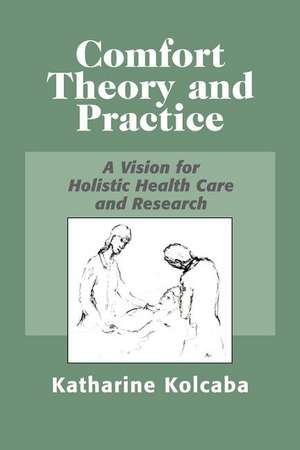Comfort Theory and Practice
Autor Katharine Kolcaba, Katherine Kolcabaen Limba Engleză Paperback – 30 noi 2002
Jean Watson, RN, PhD, HNC, FAAN
"I am honored and delighted to recommend this text for all nurses who cared for and care about patients."
from the Foreword by May Wykle, RN, PhD, FAAN
This book places comfort at the forefront of nursing care, by presenting a carefully researched theory of comfort that nurses can use as a framework for practice. Engagingly written, the book combines a first-person account of the development of the theory with supporting research, and practical information for its application. Kolcaba analyzes the concept of comfort; describes its physical, psychospiritual, environmental and sociocultural components; evaluates its meaning in the many different contexts in which health care occurs; and describes how it can be measured. The appendix includes comfort care questionnaires that can be used with patients in many settings, and a comfort scale that can be used with patients for a quick assessment of comfort. Clinicians, researchers, educators, and students will find this holistic approach helpful in setting priorities and parameters for patient care.
Preț: 479.70 lei
Preț vechi: 504.96 lei
-5% Nou
91.79€ • 96.08$ • 76.40£
Carte tipărită la comandă
Livrare economică 31 martie-14 aprilie
Specificații
ISBN-10: 0826116337
Pagini: 288
Dimensiuni: 160 x 229 x 15 mm
Greutate: 0.4 kg
Ediția:Twenty-Eighth.
Editura: Springer
Textul de pe ultima copertă
""I am most excited and impressed with the scope and focus of this work. As I began to read it, I had trouble putting it down. It is highly readable, engaging, all-inclusive, and most informative.""
Jean Watson, RN, PhD, HNC, FAAN
""I am honored and delighted to recommend this text for all nurses who cared for and care about patients.""
from the Foreword by May Wykle, RN, PhD, FAAN
This book places comfort at the forefront of nursing care, by presenting a carefully researched theory of comfort that nurses can use as a framework for practice. Engagingly written, the book combines a first-person account of the development of the theory with supporting research, and practical information for its application. Kolcaba analyzes the concept of comfort; describes its physical, psychospiritual, environmental and sociocultural components; evaluates its meaning in the many different contexts in which health care occurs; and describes how it can be measured. The appendix includes comfort care questionnaires that can be used with patients in many settings, and a comfort scale that can be used with patients for a quick assessment of comfort. Clinicians, researchers, educators, and students will find this holistic approach helpful in setting priorities and parameters for patient care. "












